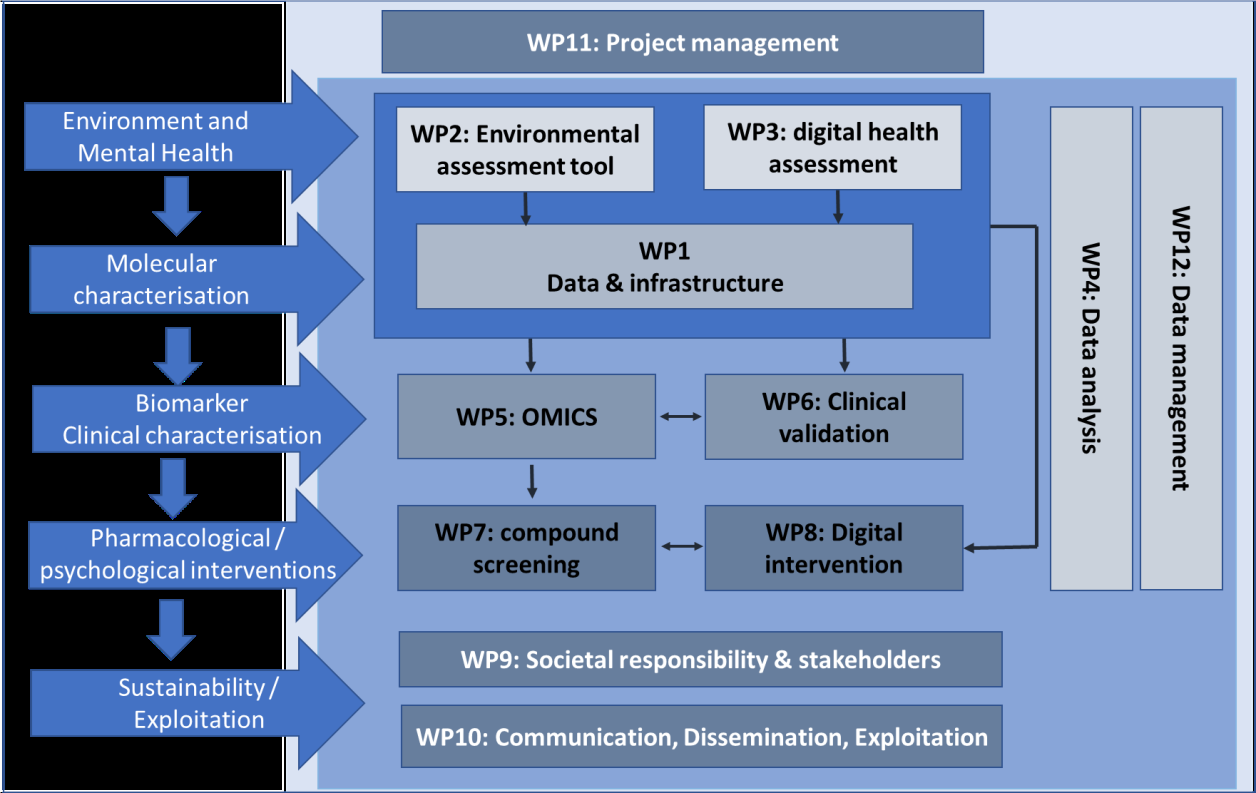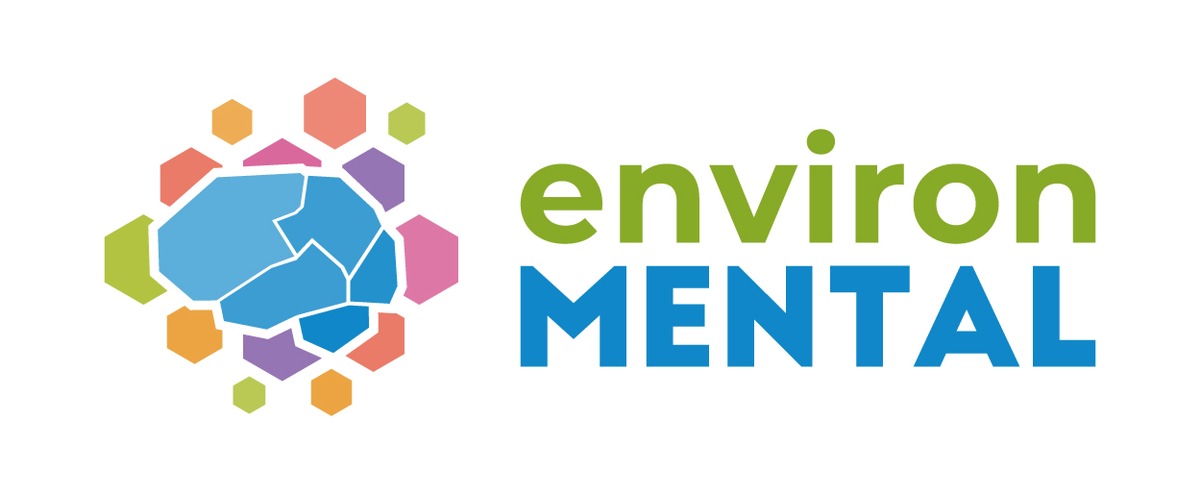Project Information
Facts & Figures
| Full project title | Reducing the impact of major environmental challenges on mental health |
| Start date | 01 June 2022 |
| End date | 31 May 2027 |
| Funding | Horizon Europe (European Union), UKRI (UK) and MOST (China) |
| Coordinated by | CHARITE – UNIVERSITAETSMEDIZIN BERLIN |
| Project information provided by the EU | https://cordis.europa.eu/project/id/101057429 |
Work Plan
The consortium is composed of a unique interdisciplinary group of internationally leading experts in neuroimaging, genetics, molecular biology, pharmacology, behavioural and neuropsychological studies, clinicians, artificial intelligence, bioinformatics, computer science, geoinformaticians, meteorologists, public health experts, epidemiologists, as well as social scientists and ethics experts.
The structure of the work involves the following sections, which follow the main objectives: (i) population-based and environmental studies also involving digital health apps, (ii) molecular and clinical characterisation, (iii) biomarkers, data analysis and data management, (iv) interventions and (v) responsible science, ethics and dissemination, all of which are designed to provide a seamless analytical pathway across the levels of observation applied in this project

Work Packages and Objectives
WP01 – UiO
WP Lead: Ole A. Andreassen
Co-Lead: Lars T. Westlye, Dennis van der Meer
Gene environment data infrastructure and discovery
Objectives: (I) Establish and maintain infrastructure for harmonising and linking big datasets; (II) Identify COVID pandemic effects on mental illness development through population data; (III) Discover environmental risk and resilience factors controlling for genetic susceptibility.
WP03 – UKSH
WP Lead: Frauke Nees
Development and implementation of digital health assessments
Objectives: (I) Provide digital assessment tools of mental health and psychosocial factors in daily life; (II) Integrate mental health assessments into multi-modal neuro-psycho-socio-behavioural clusters.
WP05 – KCL
WP Lead: Sylvane Desrivières
Co-Lead: Markus M. Nöthen
Omics characterisation in deeply phenotyped longitudinal cohorts
Objectives: (I) Mechanistic insight from integrative multi-level genetic and environmental determinants of mental illness; (II) Use enriched cohorts to develop refined, integrated multimodal biomarkers for risk and resilience for mental illness; (III) Identify neurobiologically-relevant molecular mechanisms for disease risk and progression for targeted Intervention.
WP07 – KSILINK
WP Lead: Dr. Karen Schmitt
Mechanistic investigations and drug discovery
Objectives: (I) Engineering of human embryonic and pluripotent stem cell lines reflecting prominent molecular mechanisms for neurobiologically-grounded models of cognition, behaviour and disease; (II) Generation of organoids and assessment of the molecular, functional and morphological consequences of perturbed molecular pathways on the level of an in-vitro 3D brain model; (III) Identification and validation of potential pathways and targets for chemical genomics and drug discovery approaches; (IV) Development and validation of a cellular 2D disease model for screening applications; (V) Compound screening including FDA-approved drugs (repurposing) and bioactive molecules (chemical genomics/target identification/validation.
WP09 – CHARITÉ
WP Lead: Henrik Walter, Bernd Stahl
Co-Lead: George Ogoh
Responsible Research and Innovation
Objectives: (I) Maintenance of the project’s ‘licence to operate’ through broad stakeholder engagement and participatory data stewardship; (II) Ensuring acceptability of research approaches, technology development and project innovation through inclusive reflection and co-design of scientific methodology; (III) Ensuring highest ethical standards via ethics and compliance management.
WP11 – CHARITÉ
WP Lead: Gunter Schumann
Project coordination and management
Objectives: (I) Set-up an effective communication infrastructure and foster integration; (II) Ensure the overall management, coordination and controlling of the project; (III) Identify possible risks, set-up mitigation measures and contingency plans; (IV) Ensure the proper ethical conduct of all studies relating to human participants.
WP02 – CHARITÉ
WP Lead: Gunter Schumann, Elli Polemiti
Co-Lead: Sören Hese
Development of a multimodal environmental assessment tool
Objectives: (I) Remote sensing satellite (RSS) characterisation of urbanisation and rurality; (II) Characterize climatic and atmospheric conditions and identify urbanisation changes over time; (III) Development, installation and data integration of a geodata infrastructure.
WP04 – RUMC
WP Lead: André Marquant
Data analysis and biomarker identification
Objectives: (I) Develop deep-learning based tools to infer population level genetic and environmental determinants of risk and resilience for mental disorders; (II) Estimate integrated, multi-modal stratification biomarkers to guide interventions, clinical validation, molecular profiling and predict current and future individual mental health; (III) Develop ‘virtual brain’ simulation models for validating analytic workflows and testing interventions and molecular mechanisms using synthetic data.
WP06 – ZISG
WP Lead: Tobias Banaschewski
Co-Lead: Dennis van der Meer
Replication and validation in clinical cohorts
Objectives: (I) Stratification of clinical cohorts using normative models; (II) Assessment of clinical utility of ERRS; (III) Validation in large clinical cohorts.
WP08 – UB
WP Lead: Mel Slater
Digital intervention
Objectives: (I) Develop a virtual reality (VR) programme that recreates the adverse environmental-psychosocial profile to test for directionality of the effects of environment on brain and behaviour and inform VR-based intervention; (II) A Reinforcement Learning based VR system to modify EEG brain recordings of participants associated with mental health problems induced by environmental change; (III) Prepare diffusion of the applications that work on widely available consumer devices and can be transferred into a digital health app.
WP10 – CHARITÉ
WP Lead: Esther Hitchen
Dissemination, Communication and Exploitation
The objective of WP10 is to achieve sustainable impact for the environMENTAL project results and innovations by: (I) Planning and coordinating all dissemination, communication, and engagement activities of the project; (II) Engaging with diverse international stakeholder groups and involving them in co-design and co-development processes; (III) Facilitate knowledge transfer by the provision of training courses; (IV) Planning and promoting the use and exploitation of the project results.
WP12 – CHARITÉ
WP Lead: Sven Twardziok
Data Management
Objectives: (I) Project wide data management following the FAIR principles; (II) Providing a data infrastructure; (III) Distribution of samples for analysis and integration of deep phenotyping data.

